|
|
|
Sort Order |
|
|
|
Items / Page
|
|
|
|
|
|
|
| Srl | Item |
| 1 |
ID:
186897
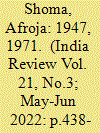

|
|
|
|
|
| Summary/Abstract |
After 24 years of the partition, the new neighboring country, Bangladesh, was born in 1971 in the Eastern region of India. The division of India and the birth of Bangladesh are, apparently, two unconnected events standing at two different times. However, researchers have found the incidents deeply interlinked. Kabir described partition not as an “event” but as an “ongoing process” while Zamindar termed this catastrophic event “a long partition” as the making of Pakistan and India involves years of social, political, and bureaucratic efforts. One of the main queries of this study is to find how partition is portrayed in Bangladeshi fictions. Do the fictions recognize the Liberation War of Bangladesh as an extension of the partition? In search of answers, the study inspects 12 Bengali novels focusing on partition and the Liberation War. This study is guided by the concept of “long partition” and the “Trauma theory” while it also takes Kabir’s theoretical proposition “Post-amnesia” into account.
|
|
|
|
|
|
|
|
|
|
|
|
|
|
|
|
| 2 |
ID:
181123
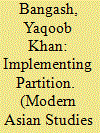

|
|
|
|
|
| Summary/Abstract |
This article focuses on the workings of the Punjab Partition Committee in the crucial months of July and August 1947. In bringing new material to the historiography of partition, this article challenges the widely held assumption that the Punjab Partition Committee did not deliver. It argues that one must assess and value the large degree of cooperation and agreement between Punjab political leaders on the Committee, despite the charged political and communal atmosphere of the summer of 1947. Furthermore, it argues that the Committee created a limited sense of order during the disarray that prevailed in the run-up to the Transfer of Power. This order was brought about by the cooperation and work of the ‘middle tier’—the bureaucrats and other officials who are often missing from partition literature. The article shows the hard, bureaucratic—yet human—side of partition during these deliberations: at the same time as these people were carrying out partition, they were also suffering its effects. Finally, the Committee's negotiations show how the soon-to-be-established provinces and dominions were setting up their respective states through the procurement of assets and resources.
|
|
|
|
|
|
|
|
|
|
|
|
|
|
|
|
| 3 |
ID:
147085
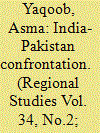

|
|
|
| 4 |
ID:
163804
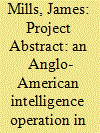

|
|
|
|
|
| Summary/Abstract |
In early 1947, American intelligence organisations learned that there were hidden collections of technical documentation that pertained to World War II German guided weapon development that were not recovered by Allied investigators in 1945. A joint Anglo-American intelligence operation was initiated in February of that year, dubbed ‘Project Abstract’ by the Americans, to recover the caches. Project Abstract was a concerted effort by British and American scientific and technical intelligence experts to round up the last material remains of the World War II guided weapon programmes at the renowned experimental and testing establishments at Peenemünde in northern Germany.
|
|
|
|
|
|
|
|
|
|
|
|
|
|
|
|
| 5 |
ID:
182413


|
|
|
|
|
| Summary/Abstract |
The “cultural turn” in memory studies acknowledges that collective memory has a distinctive social aspect reflected in the manner in which it is communicated orally from one individual or generation to another. However, the point of departure is the emphasis on the need to account for the fact that memory is, in equal measure, shaped and mediated by tangible channels such as texts, images, objects, rituals, buildings and so on. The interactions and intersections between these two strands of approaching collective memory have been employed to write the most human and engaging histories of trauma and displacement – especially in the context of the Holocaust. This article takes this discussion forward by critically looking at the scope of the field of memory studies – with its largely Western frames of reference – to facilitate a deeper understanding of similar engagements and entanglements between communicative and culturally tangible forms of collective memory in South Asia. It looks at the ways in which the dominant discourse of nationalism is constructed and contested through the politics inherent in memorialization and memory in the South Asian context by comparing the partition of 1947 that resulted in the creation of Pakistan and the Liberation War of 1971 which gave birth to Bangladesh. Through a review of some important recent works of scholarship on the long, complex and intertwined afterlife of the partition of the Indian subcontinent in 1947 and the Bangladesh Liberation War of 1971, this article shows how the processes of the construction and contestation of a dominant discourse of nationalism and nationhood are fraught with their own forms of remembrance and forgetting. And yet they speak in a language of exceptionalism that mirrors a somewhat universal template for remembering “difficult pasts” characteristic of the memorial landscape of the Holocaust. Finally, it is argued that the interstices of “national memory” contain voices that unsettle or counter it. Acknowledging these voices while also recognizing their own memory politics shall broaden and nuance the dominant modes of memorializing the partition and the Liberation War in a way that better reflects the specificities and complexities of their context.
|
|
|
|
|
|
|
|
|
|
|
|
|
|
|
|
| 6 |
ID:
149781
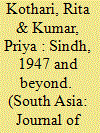

|
|
|
|
|
| Summary/Abstract |
When we came to the land of Hindustan, we were sent to a refugee camp near Ahmednagar in a special train. We were given free food, clothes, soap, for some time. Later on, an order was issued that the camp had to be shut down. We had to go to Vithalwadi near Kalyan. We left once again. Once again, we had free clothes, free electricity for almost a year. In the meanwhile proud Sindhis who felt that the free facilities would not last forever and in any case, they could not live off them any more, began looking for employment. I was one of them.
|
|
|
|
|
|
|
|
|
|
|
|
|
|
|
|
| 7 |
ID:
171296
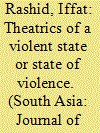

|
|
|
|
|
| Summary/Abstract |
This article engages with the subjective experiences of violence that have been written out of the histories of Partition in Kashmir. By reading the official archives ‘along the archival grain’, and by invoking the ‘small voice of history’ through memoirs (which have mostly remained untapped), this article attempts to highlight multiple experiences of Partition in the state. While the ‘tribal invasion’ of Kashmir has become the primary Indian nationalist trope in writing histories of the violence of 1947, the ‘communal violence’ which engulfed Jammu province has been treated as ‘someone else’s history—or even, not history at all’. Such narratives emphasise the political nature of violence in the state in 1947, presenting it as an exceptional space which remained above, as opposed to implicated in, the communal violence. In the case of ‘partition violence’ in Kashmir, I argue one cannot separate the political from the ‘communal’ and vice versa. An analysis of the violence in Jammu province allows one to understand the many ways in which the entanglement of the two played out against the backdrop of Kashmir’s contested accession.
|
|
|
|
|
|
|
|
|
|
|
|
|
|
|
|
| 8 |
ID:
149159
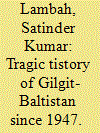

|
|
|
|
|
|
|
|